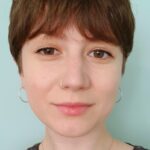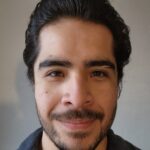The Presidential Membership Initiative was launched in 2020 as a way for the Genetics Society of America to invite talented and creative individuals from diverse backgrounds into our community. We are pleased to introduce the next cohort of Presidential Members. Throughout 2023, they will network with one another and with other Society and Board members, participate in GSA Conferences, and be valued additions to our community. Welcome, Presidential Members!
We are introducing Presidential Members this week, so be sure to check back and meet your new colleagues.

Paloma Martínez-Alesón García
Postdoc
My main research is developed with microorganisms. I have used different microorganisms like bacteria and microalgae (eukaryotic and cyanobacteria) to approach different questions in the fields of biotechnology, ecology and evolution. My goal for my next career steps is to find a postdoctoral position that allows me to continue developing different skills to answer different questions in population dynamics and learning new applications we can develop from microorganisms.

David McQuarrie
Graduate Student, Murray Lab, Harvard University
My research asks whether the proper temporal expression of cell cycle genes is required for the eukaryotic cell cycle or a fail-safe mechanism. Additionally, we’re interested in understanding the consequences of transcriptional dysregulation of cell cycle genes, a common phenomenon in cancer cells.

Pankaj Mehrotra
Biology and Health Science Instructor at the University of the People, California
My PhD research focussed on elucidating the role of cell signaling proteins of fungal cells (using genetic mutants of fungal cells) in recognition with innate immune cells. My master’s degree research focussed on genomics, transcriptomic, and proteomics in avian malaria parasites, fungi, and bacteria.

Rob Melde
Graduate Student, Sharp Lab, University of Wisconsin—Madison, Integrative Biology
My interests are in biological factors impacting the rates at which mutations occur, and in employing experimental evolution studies to investigate this topic.

Fiona Messer
Postdoc, White-Cooper Lab, Cardiff University, UK
My research focuses on sperm heteromorphism: the process of making multiple types of sperm within the same individual. This occurs in the Obscura species group of Drosophila, which produce sperm of multiple lengths. I use molecular and genetic techniques to understand the role of transcription factors in the development of the three sperm types.

Manuel Michaca
Graduate Student, Vasudevan Lab, University of Pittsburgh
I research ATF4-mediated homeostasis through regulation of steroid hormone activity and characterizing novel interactions of ATF4 with other bZip transcription factors using Drosophila melanogaster fat body.

Carolina Isabel Miño
Researcher (Adjunct)
Conservation geneticist interested in applying theoretical framework and methodological tools from population genetics to the conservation of biodiversity, with emphasis in the Neotropical region.

Melissa Mychalczuk
Undergraduate Student, Vasudevan Lab, University of Pittsburgh
Our lab studies the Integrated Stress Response pathway modeled in Drosophila melanogaster. My current project focuses on understanding sex differences in stress response and tolerance through development and in the adult fly.

Oluwatimileyin Olawale
Graduate Student, CPT Laboratory, University of Ilorin
My research is based on the genetic modification of cucurbits to fungal infections, especially Fusarium.

Alexa Pérez Torres
Graduate Student, Murray Lab, Harvard University
My research asks whether the proper temporal expression of cell cycle genes is required for the eukaryotic cell cycle or a fail-safe mechanism. Additionally, we’re interested in understanding the consequences of transcriptional dysregulation of cell cycle genes, a common phenomenon in cancer cells.




